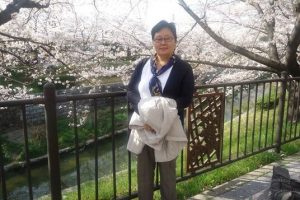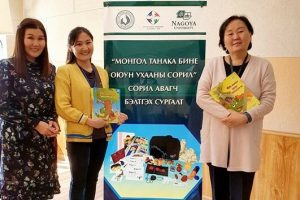By Iderbold Batbayar
Have you ever thought deeply about how you think about disability and what your version of its definition would be? Dr. Odgerel’s story has a lot to tell. After committing 34 years of her life to the special education sector and educating herself in the former Soviet Union and Japan, her contrasting insights were an eye-opener for me. When she graduated from the State University in Leningrad (now St. Petersburg) in 1984 with a specialization in education science, the perspective with which the study viewed special education was centered around disability, impairment, and thus it was called the study of ‘defectology’.
After the 90s democratization, she remained in the education sector and worked at the 29th school, the Institute for Teachers’ Development, and the Ministry of Education. Knowing how much more needs to be done, she sought for answers from developed countries, and found one in Japan, where she graduated with her masters and doctoral studies further specializing in special education. There, she encountered the notion of special needs for the first time and realized how big the gap was between Mongolia and Japan. The approach on disability not from an angle of impairment and how the impaired ought to adapt to the environment but instead seeing it from the perspective of what special help is needed for someone to develop, has impressed her about the Japanese education. The key question here is whether those in need are getting the help they require to realize their potential.
Who Is Missing Out?
Currently, Mongolian laws and regulations consider only six categories of disability. Those include vision, hearing, mental, speech or language impairment, musculoskeletal disorder, and combined disabilities. In contrast, the USA, the UK, and Japan, have thirteen, eleven, and ten categories respectively. The Mongolian categorization is still limited to those of physical impairment, whereas other countries pay special attention to developmental difficulty, attention deficiency, and behavioral changes.
Another issue is that physical impaired and intellectually impaired are kind of put into the same box. A child who has physical impairment, but none of the developmental and behavioral changes, does not need a special curriculum. If the school environment is accessible to them, they are fully capable of competing with other students. In other words, by excluding them from the regular school environment, we hinder them from reaching their full potential.
Vice versa, when encountering someone with a developmental difficulty, we treat them as if their physical or organic system is somehow different, as if they were missing something a like hand or eyesight. Dr. Odgerel emphasizes the need for the education sector to really differentiate about who needs what type of help to recover from the impairment or reach their full potential. Which capacities are fully or less developed? This is the question that should be the guiding the education sector.
Moreover, different sectors should have different guidelines, laws, and regulations to support them. For instance, the ‘Mongolian Law on Disabled People’ has a too generic definition of disability, and there is no specific law on education of disabled people, rather the law regulates all sectors’ relations with disabled people. Consequently, there is only framework that regulates the existence of such framework, but does not specify the methodology, processes, and practices in real life. As mentioned earlier, Mongolians with developmental difficulty, attention deficiency, and behavioral change are not being identified. But how can we identify them correctly?
Developing Mongolian Version of Tanaka B Intelligence Scale
We all may remember someone from our own school days who did not pay as much attention to what the teacher might have to say. But were they harshly judged by their peers and teachers alike, while they only needed a little bit of help, instead of stigmatization and punishment? When encountering those pupils, many teachers deal with them by giving more assignments and extra individual lessons. But the results are factually unsatisfactory. The key question becomes, “are they just not intelligent enough, or do they need special support?”
To clarify this question in the Mongolian context, Dr. Odgerel and her colleagues from the Nagoya University have developed the intelligence test questionnaire for Mongolian children. One thousand and eighteen kids have participated in the questionnaire to verify the methodology and fine tune the questionnaire to the Mongolian context, thereby as well considering the differences between the countryside and the city. Currently, the survey-takers are being trained and it is expected to be utilized in the future, so that children with developmental difficulties can be identified correctly.
Towards a Positive Terminology and Attitudes
To come back to the question of who is not getting the help they require to fulfill their potential as a human being, some alarming numbers can be declared. Under our current categorization, only those with physical impairment (as verified by medical professionals) get the government’s approved special education. In contrast, other developed countries provide special education for non-physical disabilities in about 70% to 80% of the cases. Thus, it is easy to predict that we are touching only the tip of the iceberg when it comes to providing support for those in need.
However, it is not only about the legal restrictions. Most of the time, our fellow Mongolians, the parents of other children get in the way of educational path of disabled people in primarily two ways. First, the parents of children with specific learning disability do not want to recognize it. Secondly, parents of other children do not want their kid to be the fellow pupil of children with disability. Both relate to the negative connotation in the Mongolian language that it is associated with being unable to develop and being somehow incomplete. As a solution, Dr. Odgerel advocates for a positive terminology in describing people with disabilities from an educational perspective such as people with special educational needs. This will not only have a positive impact on the everyday experience of people with special needs, but also enable the teachers, the parents of other children, the pupils, and school staff, to work and interact with people with special needs in a positive manner. Stigmatization must end in our minds, and it starts with the change of terminology.
Author: Iderbold Batbayar is a prospective data scientist graduating from the LETU Mongolia American University and has a background in political science from the Philipps University of Marburg, Germany. Simultaneously with his studies, he provides consultancy services for UNDP Policy Innovation Project and media organizations on various projects. He supports causes associated with equality of opportunity, open data, and ethical business.
The Untold podcast and blog post are made available by the generous support of the Friedrich Ebert Foundation in Mongolia. We also want to thank our editor Riya Tikku.



 Follow
Follow